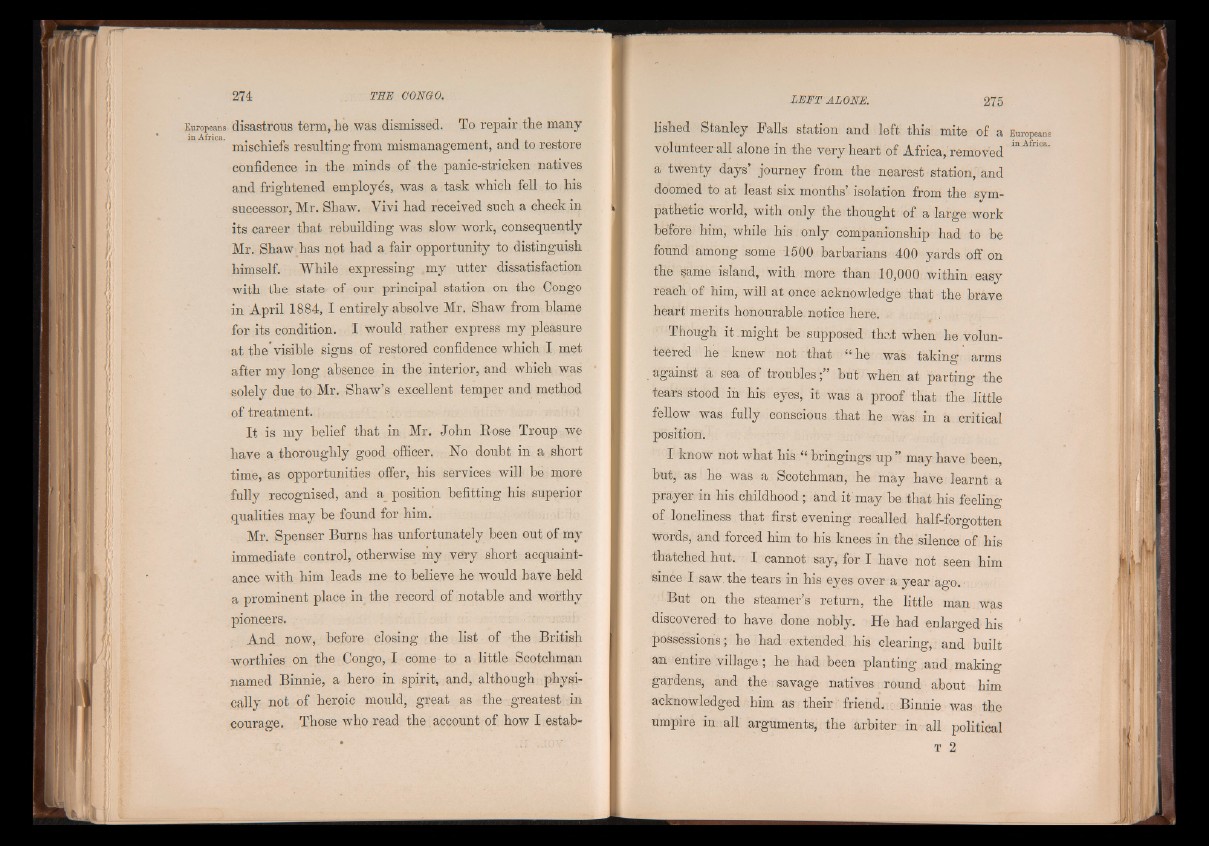
disastrous term, tie was dismissed. To repair the many
mischiefs resulting from mismanagement, and to restore
confidence in the minds of the panic-stricken natives
and frightened employes, was a task which fell to his
successor, Mr. Shaw. Vivi had received such a check in
its career that rebuilding was slow work, consequently
Mr. Shaw has not had a fair opportunity to distinguish
himself. While expressing my utter dissatisfaction
with the state of our principal station on the Congo
in April 1884, 1 entirely absolve Mr. Shaw from blame
for its condition. I would rather express my pleasure
at the’visible signs of restored confidence which I met
after my long absence in the interior, and which was
solely due to Mr. Shaw’s excellent temper and method
of treatment.
I t is my belief that in Mr. John Rose Troup we
have a thoroughly good officer. No doubt in a short
time, as opportunities offer, his services will be more
fully recognised, and a_ position befitting his superior
qualities may be found for him.
Mr. Spenser Burns has unfortunately been out of my
immediate control, otherwise my very short acquaintance
with him leads me to believe he would have held
a prominent place in the record of notable and worthy
pioneers.
And now, before closing the list of the British
worthies on the Congo, I come to a little Scotchman
named Binnie, a hero in spirit, and, although physically
not of heroic mould, great as the greatest in
courage. Those who read the account of how I established
Stanley Falls station and left this mite of a
volunteer all alone in the very heart of Africa, removed
a twenty days’ journey from the nearest station, and
doomed to at least six months’ isolation from the sympathetic
world, with only the thought of a large work
before him, while his only companionship had to be
found among some 1500 barbarians 400 yards off on
the same island, with more than 10,000 within easy
reach of him, will at once acknowledge that the brave
heart merits honourable notice here.
Though it . might be supposed that when he volunteered
he knew not that i' he was taking arms
, against a sea of t r o u b l e s b u t when at parting the
tears stood in his eyes, it was a proof that the little
fellow was fully conscious that he was in a critical
position.
I know not what his “ bringings u p ” may have been,
but, as he was a Scotchman, he may have learnt a
prayer in his childhood; and it may be that his feeling
of loneliness that first evening recalled half-forgotten
words, and forced him to his knees in the silence of his
thatched hut. I cannot say, for I have not seen him
since I saw the tears in his eyes over a year ago.
But on the steamer’s return, the little man was
discovered to have done nobly. He had enlarged his
possession’s; he had extended his clearing, and built
an entire village; he had been planting and making
gardens, and the savage natives; round about bim
acknowledged him as their friend, . Binnie was the
umpire in all arguments, the arbiter in- all political
T 2
Europeans
in Africa.